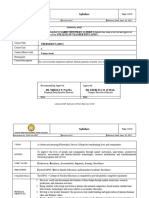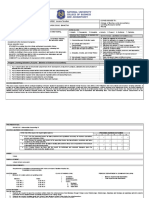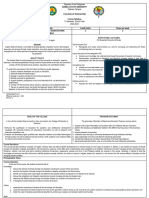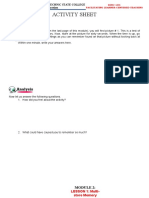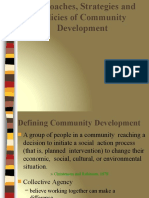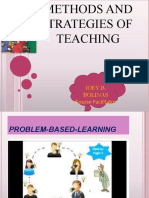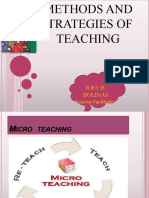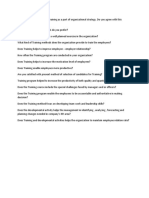Syllabus: Ilocos Sur Polytechnic State College
Syllabus: Ilocos Sur Polytechnic State College
Uploaded by
Joey Bojo Tromes BolinasCopyright:
Available Formats
Syllabus: Ilocos Sur Polytechnic State College
Syllabus: Ilocos Sur Polytechnic State College
Uploaded by
Joey Bojo Tromes BolinasOriginal Title
Copyright
Available Formats
Share this document
Did you find this document useful?
Is this content inappropriate?
Copyright:
Available Formats
Syllabus: Ilocos Sur Polytechnic State College
Syllabus: Ilocos Sur Polytechnic State College
Uploaded by
Joey Bojo Tromes BolinasCopyright:
Available Formats
SYLLABUS
ILOCOS SUR POLYTECHNIC STATE COLLEGE
Document No. ISPSC-AA-F027 Revision No. 1 Effectivity Date: Oct. 18, 2019
APPROVAL SHEET
This syllabus prepared and submitted by MR. JOEY B. BOLINAS, for Master of Arts in Education students has been reviewed
and approved for use by the faculty and student of the GRADUATE SCHOOL.
Course Code MAEd 221
Course Title Community Development with Action Research
Course Unit 3 units
Contact Hours/week 3 hrs/week
Pre-requisite None
This course aims to teach students how to plan, develop, implement, monitor and evaluate community
Course Description projects, likewise to develop students into effective social development practitioners so that they will be able to
assist people in transforming themselves into a participating citizenry imbued with a strong sense of identity,
community, and national purpose.
Recommending Approval: Approved:
IMELDA N. BINAY-AN, PhD EDERLINA M. SUMAIL, PhD
Program Dean Campus Administrator
Date: Date:
Lead yourself, lead your school, and lead your world.
SYLLABUS
ILOCOS SUR POLYTECHNIC STATE COLLEGE
Document No. ISPSC-AA-F027 Revision No. 1 Effectivity Date: Oct. 18, 2019
VISION: A vibrant and nurturing Polytechnic Service College for transforming lives and communities.
To improve the lives of people and communities through quality instruction, innovations, productivity
MISSION: initiatives, environment and industry-feasible technologies, resource mobilization and transformation outreach
programs and services.
Productivity
Resiliency
Accountability
CORE VALUES:
Ingenuity
Synergy
Excellence
Flourish ISPSC,
PHILOSOPHY: Deliver Quality Education and Services and
Launch Academic Excellence
1. To provide quality, relevant and accessible graduate education in the service area;
2. To produce competent, responsible and globally competitive and productive professionals responsive to the
needs of the service area;
COLLEGE GOALS:
3. To strengthen research and development capabilities for demand-driven and environment-friendly
technologies; and
4. To mold desirable values in the profession contributory to sustainable development.
PROGRAM 1. To enable aspiring leadership in education to become more informed about critical issues in educational
OBJECTIVES: management;
2. To help them cope positively and effectively with the management challenges that are currently influencing
education;
Lead yourself, lead your school, and lead your world.
SYLLABUS
ILOCOS SUR POLYTECHNIC STATE COLLEGE
Document No. ISPSC-AA-F027 Revision No. 1 Effectivity Date: Oct. 18, 2019
3. To enhance their ability to conduct relevant researches on educational management; and
4. To enable them to conduct independent research to test existing knowledge or to contribute new knowledge
about the different aspects of educational management.
Institutional Outcome: Highly skilled and globally competitive graduates imbued with values and virtues possessing a deep sense of
commitment towards the improvement of the quality of life of the people and the communities.
Program Outcomes: Based on CMO # 75, s. 2018 and BOT Resolution No.164, s. 2018
PO1 Demonstrate deep understanding of concepts and principles
PO2 Apply scientific inquiry in teaching and learning
PO3 Utilize effective community teaching and assessment methods
PO4 Manifest meaningful and comprehensive pedagogical content knowledge on action research.
COURSE OUTCOMES AND RELATIONSHIP TO PROGRAM OUTCOMES
Program Outcomes
Course Outcomes
PO1 PO2 PO3 PO4
CO1: Demonstrate an understanding on the building of community I I I I
CO2: Infer concepts on the different methodologies used in teaching community development I I I I
CO3: Demonstrate an understanding in building community and develop an action research based on
P P P P
particular community problem that exist.
CO4: Manifest the community development activities through an extension activity complied with
D D D D
an action research on ICT to teachers in the community.
I – Introduce P – Practice D - Demonstrate
Lead yourself, lead your school, and lead your world.
SYLLABUS
ILOCOS SUR POLYTECHNIC STATE COLLEGE
Document No. ISPSC-AA-F027 Revision No. 1 Effectivity Date: Oct. 18, 2019
LEARNING PLAN
Intended Learning Assessment
Course Intended Learning Activities (ILAs) Tasks (ATs) Instructional
Course Topics Time Frame
Outcomes Outcome Lecture Lecture Resources
Laboratory Laboratory
An Introduction to
Community
Development
by Rhonda
Phillips/Robert H.
Discuss the basic
Pittman
concept on community
development
Introduction to basic Theory, Practice,
concepts of community and Community
Discuss the values
development Development
and principles of
by
community Values and principles of
Mark Brennan
development community development 12 Virtual
CO1 Jeffrey Birdger
The seven theories for hrs Orientation
Theodore R. Alter
Discuss the seven seven community
theories for seven developers
Social and
community developers Asset-based community Community
development. Development
Illustrate an asset-
Practice
based community
by Manohar
development
Pawar
Asset Building &
Community
Development
Lead yourself, lead your school, and lead your world.
SYLLABUS
ILOCOS SUR POLYTECHNIC STATE COLLEGE
Document No. ISPSC-AA-F027 Revision No. 1 Effectivity Date: Oct. 18, 2019
by Anna Haines
and Gary Paul
Green
An Introduction to
Community
Development
by Rhonda
Phillips/Robert H.
Discuss community
Pittman
development practice
Theory, Practice,
Agitate on community
Community Development and Community
visioning and strategic
Practice Development
planning
Preparation and Planning by
Formative
Online Mark Brennan
Discuss on Community Visioning and Quizzes
Learning Jeffrey Birdger
establishing Strategic Planning
CO 1 15 Theodore R. Alter
community-based Establishing based Situational
hrs Modular
organization organization Analyses
Approach Social and
Developing community
Community
Discuss on developing leadership skills Development
community leadership Community development Practice
skills assessment by Manohar
Pawar
Discuss on community
development
Asset Building &
assessment
Community
Development
by Anna Haines
and Gary Paul
Green
Lead yourself, lead your school, and lead your world.
SYLLABUS
ILOCOS SUR POLYTECHNIC STATE COLLEGE
Document No. ISPSC-AA-F027 Revision No. 1 Effectivity Date: Oct. 18, 2019
MIDTERM EXAMINATION
An Introduction to
Community
Development
by Rhonda
Phillips/Robert H.
Pittman
Theory, Practice,
and Community
Introduction to Extension Development
Activities ICT-based by
Choose and explain
Program Formative Mark Brennan
the appropriate Online
Action Research Format Quizzes Jeffrey Birdger
research design for the Learning
- Procurement and Theodore R. Alter
CO 2 study
Preparation of Situational
CO 3 21 Modular
Materials Analyses Social and
Discuss the different hrs Approach
- Gathering of Data Community
parts of an action
- Application of Development
research
Treatments Practice
- Data Analysis by Manohar
Pawar
Asset Building &
Community
Development
by Anna Haines
and Gary Paul
Green
Lead yourself, lead your school, and lead your world.
SYLLABUS
ILOCOS SUR POLYTECHNIC STATE COLLEGE
Document No. ISPSC-AA-F027 Revision No. 1 Effectivity Date: Oct. 18, 2019
An Introduction to
Community
Development
by Rhonda
Phillips/Robert H.
Pittman
Theory, Practice,
and Community
Development
by
Formative
Display manifestations Online Mark Brennan
Quizzes
if performance of Learning Jeffrey Birdger
CO 4
learners increases Assessing the Final Result
Situational
Theodore R. Alter
after the intervention of the Study 6 Modular
Analyses
gives hrs Approach Social and
Community
Development
Practice
by Manohar
Pawar
Asset Building &
Community
Development
by Anna Haines
and Gary Paul
Green
FINAL EXAMINATIONS
Lead yourself, lead your school, and lead your world.
SYLLABUS
ILOCOS SUR POLYTECHNIC STATE COLLEGE
Document No. ISPSC-AA-F027 Revision No. 1 Effectivity Date: Oct. 18, 2019
MAJOR COURSE OUTCOMES
An evidence of attaining the above course outcomes, students are required to do and submit the following during the indicated dates of
the term. The rubrics for these outputs are provided.
Required Output Performance Target Course Outcomes it represents Due Date
MCO1: Research Title 99.9% CO1 1st week
MCO2: Chapter 1 of the Study 99.9% CO2 2nd week
MCO3: Methods of Research Design 99.9% CO2 3 /4th week
rd
MCO4: Chapter 2 of the Study 99.9% CO3 5th week
MCO5: Manuscript 99.9% CO4 6th week
Laboratory Activities: N/A
RUBRICS FOR ASSESSMENT TO BE USED FOR MCO
CRITERIA Excellent Very Satisfactory Satisfactory Unsatisfactory
91-100% 81-90% 71-80% 61-70%
Presentation
Relevance to the Course
Editing styles and technicality
Feasibility
OTHER COURSE REQUIREMENTS:
Assignments
Online Participation
Quizzes
Exams
Lead yourself, lead your school, and lead your world.
SYLLABUS
ILOCOS SUR POLYTECHNIC STATE COLLEGE
Document No. ISPSC-AA-F027 Revision No. 1 Effectivity Date: Oct. 18, 2019
GRADING SYSTEM
The following shall be used as basis for giving grades as per approved Student Handbook through BOT Res. #164, s. 2018
TERM GRADE:
60% Class Standing……………………… Class Standing:
40% Term Exams Action Research Title Proposal 40%
Review of Literature of the Proposed AR
FINAL GRADE: Activities/Worksheets 60%
Midterms 50%
Finals 50%
100%
CLASSROOM POLICIES
(Not applicable during pandemic since Face-to-face Teaching is NOT ALLOWED)
1. Attendance:
Students are expected to regularly and punctually attend classes.
LATE MARKS are given to students arriving 15 minutes after the scheduled class period.
Three (3) LATE marks is equivalent to one (1) absent. Three (3) consecutive or five (5) cumulative absences results to RE-
ADMISSION to the class wherein class card i given to the Program Dean/Institute Director which should be returned to the
instructor by the student himself/herself.
Failure to return the class card means non-admission to the class
2. Uniform and ID:
Students should wear the prescribed uniform (MF – School Uniform – Type A; TTH – Departmental Uniform (Type B) – as prescribed for
the subject, i.e. PE, NSTP, Field Work, etc.
3. Submission of Requirements:
Lead yourself, lead your school, and lead your world.
SYLLABUS
ILOCOS SUR POLYTECHNIC STATE COLLEGE
Document No. ISPSC-AA-F027 Revision No. 1 Effectivity Date: Oct. 18, 2019
Requirements are expected to be submitted on or before the deadline; failure to submit on the schedule deadline means NO
ACCEPTANCE of requirement.
4. Laboratory Activities:
Non-performance of Laboratory Activity means 5.0 for the particular activity, unless otherwise allowed by the instructor to
conduct/perform for a make-up for missed laboratory activity
5. Term Examinations:
6. Dishonesty:
Offences on dishonesty/cheating during examination period will be dealt with accordingly as stipulated in the Student Handbook
7. Additional Requirements:
Attendance to Field Trip, School Activities like Gender and Development; Linggo ng Wika; Intramurals; Intercampus; Christmas Program;
Foundation Week; Charter Day; Graduation; Recognition; Departmental Programs
REFERENCES
An Introduction to Community Development by Rhonda Phillips/Robert H. Pittman
Theory, Practice, and Community Development by Mark Brennan,Jeffrey Birdger,Theodore R. Alter
Books: Social and Community Development Practice by Manohar Pawar
Asset Building & Community Development by Anna Haines and Gary Paul Green
Journals: The Routledge Handbook of Community Development: Perspectives from Around the Globe
International Consortium for Social Development Asia-Pacific Branch (ICSDAP)
Community Development: Journal of the Community Development Society (COMMUNITY DEVELOPMENT)
International Journal of Community Development and Management Studies (IJCDMS)
Training Manual: CDFIs (Community Development Financial Institutions)
http://www.greencommunitiesonline.org/
Online Resources:
http://www.enterprisecommunity.org/resources/
Collected Readings on Community Development in Singapore
Ledwith, M. (2016) Commununity Development in Action. Putting Freire into Practice. Polity Press
Suggested
Oliver, B. and Pitt, B. (2013) Engaging Communities and Service Users. Context, Themes and Methods. Palgrave
Readings:
McMillan
Thompson, N. (2012) People Solutions Sourcebook. Palgrave McMillan
Lead yourself, lead your school, and lead your world.
SYLLABUS
ILOCOS SUR POLYTECHNIC STATE COLLEGE
Document No. ISPSC-AA-F027 Revision No. 1 Effectivity Date: Oct. 18, 2019
Prepared by:
NAME: JOEY B. BOLINAS
Email address saintbojo@yahoo.com / saintbojo@gmail.com
Contact Number 09302010330
Consultation Hours
____________________________ _________________
Signature Date
Lead yourself, lead your school, and lead your world.
You might also like
- ENITV21D 1 Intervention For ChemistryDocument8 pagesENITV21D 1 Intervention For ChemistryMateo HernandezNo ratings yet
- BBB Month 52 Lower Upper Workout PlanDocument7 pagesBBB Month 52 Lower Upper Workout PlanBurcu Senol100% (1)
- Anatomy and Physiology (BPE)Document8 pagesAnatomy and Physiology (BPE)Shiela MantillaNo ratings yet
- Syllabus: Ilocos Sur Polytechnic State CollegeDocument11 pagesSyllabus: Ilocos Sur Polytechnic State CollegeJoey Bojo Tromes BolinasNo ratings yet
- Syllabus: Ilocos Sur Polytechnic State CollegeDocument11 pagesSyllabus: Ilocos Sur Polytechnic State CollegeJoey Bojo Tromes BolinasNo ratings yet
- Community Development With Action ResearchDocument11 pagesCommunity Development With Action ResearchJoey Bojo Tromes Bolinas100% (1)
- Movement Ed Syllabus PDFDocument10 pagesMovement Ed Syllabus PDFArjay DomisiwNo ratings yet
- Isuc-Coe-Syl Effectivity: Revision:1Document10 pagesIsuc-Coe-Syl Effectivity: Revision:1Teacher Education100% (1)
- Rizal Btled 2nd Sem 2023-2024Document10 pagesRizal Btled 2nd Sem 2023-2024Reign Khayrie Anga-anganNo ratings yet
- THERMODYNAMICS SyllabusDocument12 pagesTHERMODYNAMICS SyllabusLarry MostolesNo ratings yet
- Syllabus Ed2Document9 pagesSyllabus Ed2Jojimar JulianNo ratings yet
- BPED I Arts AppreciationDocument15 pagesBPED I Arts AppreciationJane VillaruzNo ratings yet
- Palompon Institute of TechnologyDocument11 pagesPalompon Institute of TechnologyOdessa L. UrgelNo ratings yet
- OBE Syllabus in CC 19 (TTL in The Elem. Grades)Document13 pagesOBE Syllabus in CC 19 (TTL in The Elem. Grades)Lito Mag-ampoNo ratings yet
- Syllabus: Ilocos Sur Polytechnic State CollegeDocument12 pagesSyllabus: Ilocos Sur Polytechnic State Collegely kaNo ratings yet
- Teaching Social Studies in The ElementaryDocument11 pagesTeaching Social Studies in The ElementaryAileen Rovira Anga-anganNo ratings yet
- SOCSCI203 - OBE SyllabusDocument6 pagesSOCSCI203 - OBE SyllabusJamaica CastilloNo ratings yet
- Sine BSITDocument11 pagesSine BSITReign Khayrie Anga-anganNo ratings yet
- Course Syllabus TTL2 ScienceDocument8 pagesCourse Syllabus TTL2 ScienceMelan Joy Dela Cruz100% (1)
- The Entrepreneurial Mind SyllabusDocument9 pagesThe Entrepreneurial Mind Syllabusligaowest binataganNo ratings yet
- TC 5 - BSIT FPSM - Course SyllabusDocument30 pagesTC 5 - BSIT FPSM - Course SyllabusKim TraveroNo ratings yet
- College of Education: Central Bicol State University of AgricultureDocument10 pagesCollege of Education: Central Bicol State University of AgricultureJessica R. BaldemorNo ratings yet
- Art Appre. SyllabusDocument9 pagesArt Appre. Syllabusjoylynguerrero79No ratings yet
- ScSc11n SYLLABUS23-24 RLCBDocument13 pagesScSc11n SYLLABUS23-24 RLCBRosa Leah BorerNo ratings yet
- Modern PhysicsDocument7 pagesModern PhysicsDyan Baccay-ValdepeñasNo ratings yet
- TC 5 - BS ELEC - Course SyllabusDocument31 pagesTC 5 - BS ELEC - Course SyllabusKim TraveroNo ratings yet
- NSTP SyllabusDocument11 pagesNSTP Syllabusrpd2023-5385-41870No ratings yet
- Mmw-Obtl (Canete)Document16 pagesMmw-Obtl (Canete)Anthony Rey CaneteNo ratings yet
- Revised Syllabus in Production of Social Studies Instructional MaterialsDocument11 pagesRevised Syllabus in Production of Social Studies Instructional MaterialsJay Bansale100% (2)
- Syllabus Bainctax Income Taxationpdf PDF FreeDocument8 pagesSyllabus Bainctax Income Taxationpdf PDF FreePaul Edward GuevarraNo ratings yet
- EDUC 3 Course SyllabusDocument19 pagesEDUC 3 Course SyllabuskarahcristelgNo ratings yet
- Syllabus: Ilocos Sur Polytechnic State CollegeDocument10 pagesSyllabus: Ilocos Sur Polytechnic State CollegeKaj PagatpatanNo ratings yet
- GENED10-NEUST-AAF-F001-Syllabus-of-Instruction-Rev.01 - BSEDDocument10 pagesGENED10-NEUST-AAF-F001-Syllabus-of-Instruction-Rev.01 - BSEDMarilyn M. SolimanNo ratings yet
- GEC7 SYLLABUS BECEdDocument9 pagesGEC7 SYLLABUS BECEdEden MelecioNo ratings yet
- Republic of The Philippines: Biliran Province State UniversityDocument11 pagesRepublic of The Philippines: Biliran Province State UniversityDanjever Buen LumbreNo ratings yet
- NSTP 1 Syllabus 128 1Document9 pagesNSTP 1 Syllabus 128 1AYSA GENEVIERE O.LAPUZNo ratings yet
- Ged 101 Research MethodsDocument9 pagesGed 101 Research MethodsCarlito DoringoNo ratings yet
- CD 502 (Dssrttion 2) - 2023-24 1semDocument5 pagesCD 502 (Dssrttion 2) - 2023-24 1semManolito MacalolotNo ratings yet
- Irs10 (Administration and Management of Physical Education and Health Program)Document8 pagesIrs10 (Administration and Management of Physical Education and Health Program)Jaype MedidaNo ratings yet
- Isabela State University: Republic of The PhilippinesDocument8 pagesIsabela State University: Republic of The PhilippinesGwyneth Oca DomingoNo ratings yet
- Syllabus For English 121: Campus JournalismDocument6 pagesSyllabus For English 121: Campus JournalismChabilita De amorNo ratings yet
- GE AA - BS IT - Course SyllabusDocument12 pagesGE AA - BS IT - Course SyllabusKim TraveroNo ratings yet
- Syllabus in Contemporary WorldDocument9 pagesSyllabus in Contemporary WorldYani Alolino MoloNo ratings yet
- PRO. ED. 16 2015 SyllabusDocument9 pagesPRO. ED. 16 2015 SyllabusNoe Hermosa100% (1)
- Msed 107Document11 pagesMsed 107Genrie Sarmiento Cortez PauleNo ratings yet
- Anthropological Foundation (BPE)Document8 pagesAnthropological Foundation (BPE)Shiela Mantilla100% (1)
- Ramon Magsaysay Memorial Colleges Office of The Teacher Education ProgramDocument8 pagesRamon Magsaysay Memorial Colleges Office of The Teacher Education ProgramShiela MantillaNo ratings yet
- Science, Technology and Society Syllabus. AllanDocument15 pagesScience, Technology and Society Syllabus. AllanAllan IgbuhayNo ratings yet
- Final Syllabus STS BSEdDocument12 pagesFinal Syllabus STS BSEdJobert Tambis SambitanNo ratings yet
- CPC 6 Philippine Traditional GamesDocument7 pagesCPC 6 Philippine Traditional GamesJaype MedidaNo ratings yet
- GE 2-Reading in The Phil HistoryDocument11 pagesGE 2-Reading in The Phil HistoryRamil LanuzaNo ratings yet
- SSTUD 1 SyllabusDocument11 pagesSSTUD 1 SyllabusAl Grace DoblonNo ratings yet
- Syllabus - Edu118Document7 pagesSyllabus - Edu118genesisgamaliel montecinoNo ratings yet
- Profed 9 SyllabusDocument9 pagesProfed 9 SyllabusGenesis Soriano LinglingNo ratings yet
- Syllabus Pe 101Document11 pagesSyllabus Pe 101Lester LabitoriaNo ratings yet
- EEd. Inst. 1 Climate Change and Disaster Risk ManagementDocument16 pagesEEd. Inst. 1 Climate Change and Disaster Risk ManagementEden MelecioNo ratings yet
- Syllabus Gender and SocietyDocument8 pagesSyllabus Gender and SocietyJohnson FernandezNo ratings yet
- ED 1 - The Teacher & The Community, School Culture and Organizational LeadershipDocument10 pagesED 1 - The Teacher & The Community, School Culture and Organizational Leadershipjas37004No ratings yet
- Outcomes - Based Teaching and Learning Plan in Geography: Vision Mission Motto Core ValuesDocument14 pagesOutcomes - Based Teaching and Learning Plan in Geography: Vision Mission Motto Core ValuesJoshua Neil BautistaNo ratings yet
- Syllabus For PATHFIT 2 EXERCISE BASED FITNESS ACTIVITIES 2nd Sem. AY 23 24Document25 pagesSyllabus For PATHFIT 2 EXERCISE BASED FITNESS ACTIVITIES 2nd Sem. AY 23 24johnpauld085No ratings yet
- Innovation of Higher Education: Change-Makers at Incheon National University 1From EverandInnovation of Higher Education: Change-Makers at Incheon National University 1No ratings yet
- Activity Sheet Module 1 - Lesson 2Document3 pagesActivity Sheet Module 1 - Lesson 2Joey Bojo Tromes BolinasNo ratings yet
- Activity Sheet Module 2 - Lesson 1Document3 pagesActivity Sheet Module 2 - Lesson 1Joey Bojo Tromes BolinasNo ratings yet
- Activity Sheet Module 1 - Lesson 3Document5 pagesActivity Sheet Module 1 - Lesson 3Joey Bojo Tromes BolinasNo ratings yet
- Activity Sheet Module 1 - Lesson 1Document3 pagesActivity Sheet Module 1 - Lesson 1Joey Bojo Tromes BolinasNo ratings yet
- Activity Sheet Module 1 - Lesson 4Document3 pagesActivity Sheet Module 1 - Lesson 4Joey Bojo Tromes Bolinas100% (1)
- Lesson 1: Introduction To Learner-Centered TeachingDocument28 pagesLesson 1: Introduction To Learner-Centered TeachingJoey Bojo Tromes BolinasNo ratings yet
- Community Development Course OutlineDocument2 pagesCommunity Development Course OutlineJoey Bojo Tromes Bolinas100% (2)
- Community DevelopmentDocument33 pagesCommunity DevelopmentJoey Bojo Tromes Bolinas100% (1)
- METHODS OF TEACHING Lesson 3Document15 pagesMETHODS OF TEACHING Lesson 3Joey Bojo Tromes BolinasNo ratings yet
- METHODS OF TEACHING Lesson 4Document17 pagesMETHODS OF TEACHING Lesson 4Joey Bojo Tromes BolinasNo ratings yet
- NSTP 2:: Literacy Training Service (LTS 2) & Civic Welfare Training Service (CWTS 2) Community ImmersionDocument11 pagesNSTP 2:: Literacy Training Service (LTS 2) & Civic Welfare Training Service (CWTS 2) Community ImmersionJoey Bojo Tromes Bolinas100% (1)
- METHODS OF TEACHING Lesson 6Document14 pagesMETHODS OF TEACHING Lesson 6Joey Bojo Tromes BolinasNo ratings yet
- METHODS OF TEACHING Lesson 1Document19 pagesMETHODS OF TEACHING Lesson 1Joey Bojo Tromes BolinasNo ratings yet
- METHODS OF TEACHING Lesson 5Document12 pagesMETHODS OF TEACHING Lesson 5Joey Bojo Tromes BolinasNo ratings yet
- METHODS OF TEACHING Lesson 2Document16 pagesMETHODS OF TEACHING Lesson 2Joey Bojo Tromes BolinasNo ratings yet
- Module in MathDocument8 pagesModule in MathJoey Bojo Tromes Bolinas100% (1)
- Educ103 QuizDocument6 pagesEduc103 QuizJoey Bojo Tromes BolinasNo ratings yet
- Kolaboratibong Pagkatuto Kaugnay Sa AkadDocument1 pageKolaboratibong Pagkatuto Kaugnay Sa AkadJoey Bojo Tromes BolinasNo ratings yet
- 1 Let Review Prof SubjectDocument20 pages1 Let Review Prof SubjectJoey Bojo Tromes BolinasNo ratings yet
- Philta RulesDocument9 pagesPhilta RulesJoey Bojo Tromes BolinasNo ratings yet
- Alpha Phi OmegaDocument1 pageAlpha Phi OmegaJoey Bojo Tromes BolinasNo ratings yet
- The Speed of GravityDocument8 pagesThe Speed of GravitymasharecoNo ratings yet
- Plant Cells Lab ActivityDocument5 pagesPlant Cells Lab ActivityHaris KhanNo ratings yet
- Under The Benign Grace of The Gurus: - Shakun Narain KimatraiDocument27 pagesUnder The Benign Grace of The Gurus: - Shakun Narain Kimatraigabroo5abiNo ratings yet
- Case Report Riska Permata Sari (N 111 16 032)Document10 pagesCase Report Riska Permata Sari (N 111 16 032)syaviraNo ratings yet
- Ancient HistoryDocument60 pagesAncient Historyn.ploegmanNo ratings yet
- Public International Law ProjectDocument13 pagesPublic International Law ProjectSukrit GandhiNo ratings yet
- Hobart Welding Class 3ooDocument34 pagesHobart Welding Class 3oocamby22629No ratings yet
- English10 - Q1 - W5 - M5 - EvaluatingInformationSources - MalucayCherrie (Baguio)Document29 pagesEnglish10 - Q1 - W5 - M5 - EvaluatingInformationSources - MalucayCherrie (Baguio)Genelyn San JoseNo ratings yet
- Advanced Civil Engineering Mathematics Examination PaperDocument5 pagesAdvanced Civil Engineering Mathematics Examination PaperkelvinaaaNo ratings yet
- Amerta Sari - TOO & ENOUGHDocument2 pagesAmerta Sari - TOO & ENOUGHKetut Siti Amerta SariNo ratings yet
- Genetics Jeopardy)Document32 pagesGenetics Jeopardy)Zyra ArcosNo ratings yet
- A Bi-Objective Optimization Model For A Retail Inventory System With Perishable ProductsDocument4 pagesA Bi-Objective Optimization Model For A Retail Inventory System With Perishable ProductsMariana Spanol de Camargo PereiraNo ratings yet
- Persepsi Wanita Terhadap Penjagaan Warga TuaDocument17 pagesPersepsi Wanita Terhadap Penjagaan Warga Tuafarhan ryoNo ratings yet
- Physics Form 1 QuestionsDocument10 pagesPhysics Form 1 QuestionsOkumu KevinsNo ratings yet
- Match The NumbersDocument1 pageMatch The NumbersЕвгения ХвостенкоNo ratings yet
- United States v. John Matera, Thomas Carbonaro, and Peter Gotti, 489 F.3d 115, 2d Cir. (2007)Document11 pagesUnited States v. John Matera, Thomas Carbonaro, and Peter Gotti, 489 F.3d 115, 2d Cir. (2007)Scribd Government Docs100% (1)
- 3.20.23 OIS ShootingDocument2 pages3.20.23 OIS ShootingNews 8 WROCNo ratings yet
- Agro Based IndustriesDocument31 pagesAgro Based IndustriesMithil JoshiNo ratings yet
- Kurniawan 2019 J. Phys. Conf. Ser. 1351 012006Document9 pagesKurniawan 2019 J. Phys. Conf. Ser. 1351 0120061JS19EC160 Vivek JaiswalNo ratings yet
- Usali 12 OverviewDocument6 pagesUsali 12 Overviewtaha.clientcenterNo ratings yet
- Sprinter 7G Tronic TransmissionDocument7 pagesSprinter 7G Tronic TransmissionRicardo Santo AntonioNo ratings yet
- Use of English ExerciseDocument1 pageUse of English ExerciseMinka BodzsárNo ratings yet
- Pen Names and ProponentsDocument55 pagesPen Names and ProponentsJasmine EnriquezNo ratings yet
- Ujian Praktikum FarmasiDocument2 pagesUjian Praktikum Farmasipolma12No ratings yet
- Kota Makassar TerbaruDocument1,258 pagesKota Makassar TerbaruratnoNo ratings yet
- InagroveDocument5 pagesInagroveJV GamoNo ratings yet
- Pain Gate TheoryDocument28 pagesPain Gate Theorysahinuri348No ratings yet
- ULANGAN HARIAN INVITATION SeleseDocument6 pagesULANGAN HARIAN INVITATION SeleseJunior HamdanNo ratings yet
- Eng11 Q1 Mod1 Dimensionsofphilliteraryhistory v1Document14 pagesEng11 Q1 Mod1 Dimensionsofphilliteraryhistory v1Jonathan Olegario60% (5)









